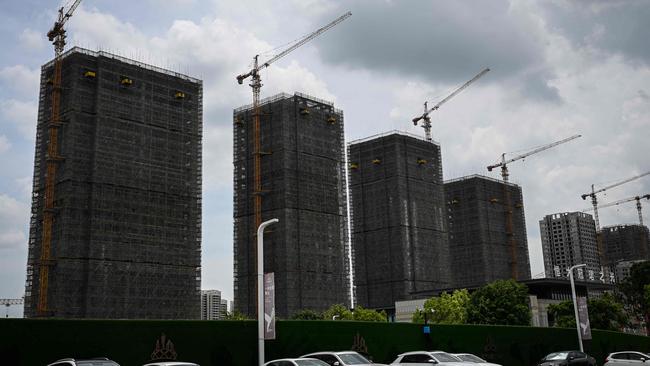China sharemarket looking attractive: Andrew Clifford
Investors waiting for major stimulus from China miss the point that measures already unveiled are potent enough to restart the nation’s property market, says Andrew Clifford.
Investors waiting for a major stimulus package from China miss the point that measures already unveiled are potent enough to restart the nation’s all-important property market, according to Andrew Clifford.
Further measures to boost confidence may be needed but Platinum Asset Management’s co-founder, co-chief investment officer and CEO says China’s fiscal stimulus is “plentiful and ongoing”.
Unlike the US market which is about 30 per cent above its pre-Covid level, China’s sharemarket is barely above its equivalent level because the post-Covid reopening recovery has faltered.
Platinum’s Global Fund has struggled with underperforming China investments in recent years. But Clifford says China’s market valuations are “really attractive by historical standards”.
Friday’s release of economic activity data is expected to show weak growth by China’s standards. The collapse in the property market after regulatory tightening that precipitated the 2021 default of one of the nation’s largest developers – China Evergrande – and others, has been nothing short of a “disaster” for the sector that accounts for about a quarter of China’s economy.
But Clifford says there have been a huge amount of stimulus measures in recent weeks and a major easing of property regulation, with the goal of bringing buyers back in. Two weeks ago, China dropped investor mortgage rates in line with those for owner- occupiers.
It dropped the deposit requirement for owner-occupiers to 20 per cent from previous levels ranging from 30 to 70 per cent, and backed away from the slogan that “houses are for living, not for speculation”, although there have been some mixed messages on that point.
It remains to be seen if buyers return to the market, and there will still be concerns about buying properties from the likes of China Evergrande or Country Garden, even though they have been given government funding to complete developments.
But the property sector deregulation is “big news”, complimented by monetary policy easing and myriad smaller scale decisions to ease fiscal policy.
“All of these things do start to add up,” says Clifford. “China doesn’t tend to come out with the massive IRA (US Inflation Reduction Act), and it’s hard to measure the impact, but it looks relatively substantial. So there is good reason to believe it doesn’t particularly get worse, because the pain from the collapse in construction has already been felt. The recovery in the actual economic numbers will take time.”

Local government finances – normally supported by land sales to property developers – are in a “crisis” which is yet to be solved, but he says the government is “clearly focused” on that.
China’s policy makers believe that a major fiscal stimulus or “helicopter money” – as was deployed in 2008 – would be a “big mistake” this time, Clifford says.
“I think they are more measured and we all, you know, think that’s the wrong thing.”
For those who remain sceptical of China’s ability to avoid a “debt deflation loop”, he highlights China’s importance in the supply chain for bigger trends, like climate change.
“Even if you don’t want to buy into that, when we talk about some of these bigger trends – like climate change – who absolutely dominates the supply chain of everything we need for greening our homes? It’s China,” he says. “Who’s got sodium-ion batteries in motor vehicles today? China.
“So I think this (China’s sharemarket) is a huge opportunity.”
Moreover, apart from property, large parts of China’s economy are doing well. E-commerce deliveries in the June quarter rose 20 per cent year-on-year. Ad revenue at Tencent rose 25 per cent.
The number of domestic air passengers in July was 15 per cent above pre-Covid levels. Airfares are 15-20 per cent above pre-Covid levels, in a country with little to no inflation.
In the June half, China surpassed Japan as the world’s largest exporter of cars, fuelled by surging exports of EVs.
One of Platinum’s biggest stakes is in a Chinese company called ZTO, the “FedEx of China”. As a low cost operator with a roughly 25 per cent market share of mail deliveries in China, ZTO has seen growth of 25 per cent this year and first half operating profits rose 50 per cent on year.
“Given how far the number two and three and four and five are behind them, and that they’re not generally been profitable, I expect ZTO will eventually to get 50 per cent market share,” he says.
“And the underlying market is also growing. So these guys can grow volume for a very long time.
“They’ve gone from 6 billion parcels five years ago, they’ll do 30 billion this year, and FedEx and UPS combined do 12 billion. It trades on a forward PE multiple of 15 times, which for the kind of growth ahead of it is extraordinarily cheap. Its market capitalisation is $US20bn, whereas FedEx and UPS combined is almost $200bn.”







To join the conversation, please log in. Don't have an account? Register
Join the conversation, you are commenting as Logout